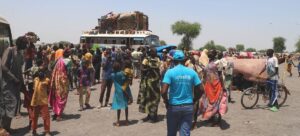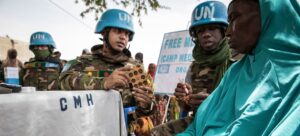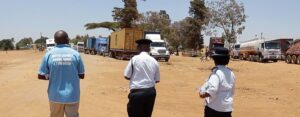“I used to transport sugar from Malawi,” said an anonymous driver, who was arrested for migrant trafficking. “In 2016, I had to wait for several days at a border crossing in Tanzania for customs checks. I was approached by a man who offered me a lot of money to transport goats.”
His story is not unique.
Malawi is located at the crossroads of several significant flows of people fleeing conflict, instability, and poverty in Central Africa and the Horn of Africa.
Such movements provide lucrative opportunities for smugglers and traffickers and for Malawi’s 5,000 registered international truck drivers.
The driver who shared his story said he was paid in advance, and the man who offered him the deal took photos of both him and his truck. The driver proceeded to spend some of the money and send more to his wife.
“On the day I was due to leave, the man told me the ‘goats’ were actually 30 illegal migrants from Ethiopia,” he said. “They looked very sick, tired, and malnourished. He said I had to take them to a location in Malawi that’s close to a large refugee camp.”
Smuggler threats
A truck travels up to East Africa.
When the driver tried to protest, the smuggler demanded his money back and threatened to take the truck and share photos of him with the authorities.
“This is how it all started, and soon it became my main business,” he said. “The man would pay me a lot of money and escort me in a small car, so he could bribe corrupt police and immigration officers along the way.”
According to the driver, he was initially not aware that what he was doing was illegal.
Then, in 2019, he was arrested in Mozambique while transporting 72 migrants from Malawi and the Democratic Republic of the Congo (DRC).
“Now I’m sick, unemployed, and divorced,” the driver said.
Trafficking risks
Truck drivers based in Malawi are now learning about the risks of transporting migrants and trafficking victims, thanks to a programme supported by the UN Office on Drugs and Crime (UNODC). The courses, which began in February, are already proving to be a success.
Feckson Chimodzi, a truck driver who transports farming products from countries in Southern Africa into Malawi and also participated in the course, said drivers who work with smugglers and traffickers often do it “out of necessity” to supplement their low salaries.
“Our employers need to improve our working conditions and give us comprehensive training about the dangers of getting involved in these crimes,” Mr. Chimodzi said.
Strict penalties
Maxwell Matewere, addresses a local community in Malawi about the threat of human trafficking.
Criminals who smuggle or traffic humans within countries or across borders use all possible routes and modes of transportation to transfer people for profit and exploitation.
If apprehended by authorities, the truck drivers are usually arrested and imprisoned, explained Maxwell Matewere, a UNODC National Project Officer on trafficking in persons.
“There’s a lack of understanding of human trafficking and migrant smuggling in the region, and payment for illegally transporting people is much larger than the regular truck driver’s salary,” said Mr. Matewere, who conducts the training.
“Most drivers know what they’re doing is illegal, but are told that when they cross borders, corrupt officials will let them pass,” he said. “So, they take the money and the risk.”
Vehicle confiscations and arrests
Migrants travel by foot and by vehicle across Africa in order to reach Europe and other destinations.
Following a series of vehicle confiscations and arrests in neighbouring countries, the Professional Drivers Association of Malawi asked UNODC to train its members on the dangers of transporting smuggled migrants and victims of trafficking.
A total of four courses for around 400 drivers have been conducted, with further sessions scheduled in October. The participants are informed about the penalties they face if caught, including the loss of both their truck and employment, a criminal record, and potential imprisonment of up to 14 years in a foreign country.
Positive impact, new allies
Since the start of the UNODC courses, the Professional Drivers Association has reported a reduction in the number of arrests of Malawian drivers on charges of migrant smuggling and human trafficking.
Many drivers who attended the training are proving to be “very useful allies” in the prevention and detection of cases of migrant smuggling and human trafficking, said Mr. Matewere said.
“We explain that migrant smuggling and human trafficking are serious organized criminal activities punishable by laws in Malawi and the countries the drivers transit, such as Zimbabwe, Zambia, Tanzania, and Mozambique,” he said.
“Furthermore, the drivers are told that these crimes are linked to exploitation, abuse, and violence and can even result in death, and we tell them about the connections to other illicit activities such as drugs and firearms smuggling,” he added.
Last year, Malawi’s Ministry for Homeland Security appointed a new group of law enforcement officers to counter the increasing cases of migrant smuggling and human trafficking.
“We’ve established contact between the truck drivers we trained and this specialised unit, so they now know who to inform when they’ve been approached by criminals to carry people in their vehicles,” Mr. Matewere said.
Since May, seven attempts of human trafficking and migrant smuggling have been stopped by authorities at border crossings due to information from truck drivers. A recent case involved 40 Malawians, including children, who were being taken in three trucks to South Africa and intercepted on the border with Zambia.
The awareness-raising courses are organized through UNODC’s human trafficking and migrant smuggling section, with the cooperation of Malawi’s Ministry of Homeland Security and financial support from the Government of Sweden.
Find out more about how UNODC is tackling human trafficking and migrant smuggling here.

















